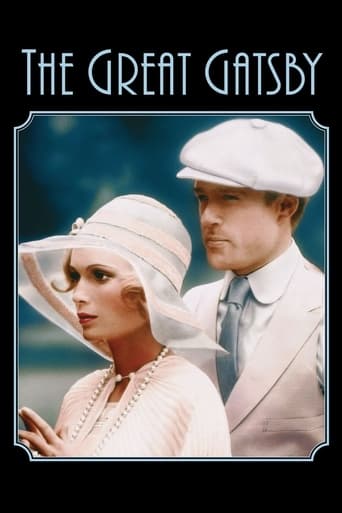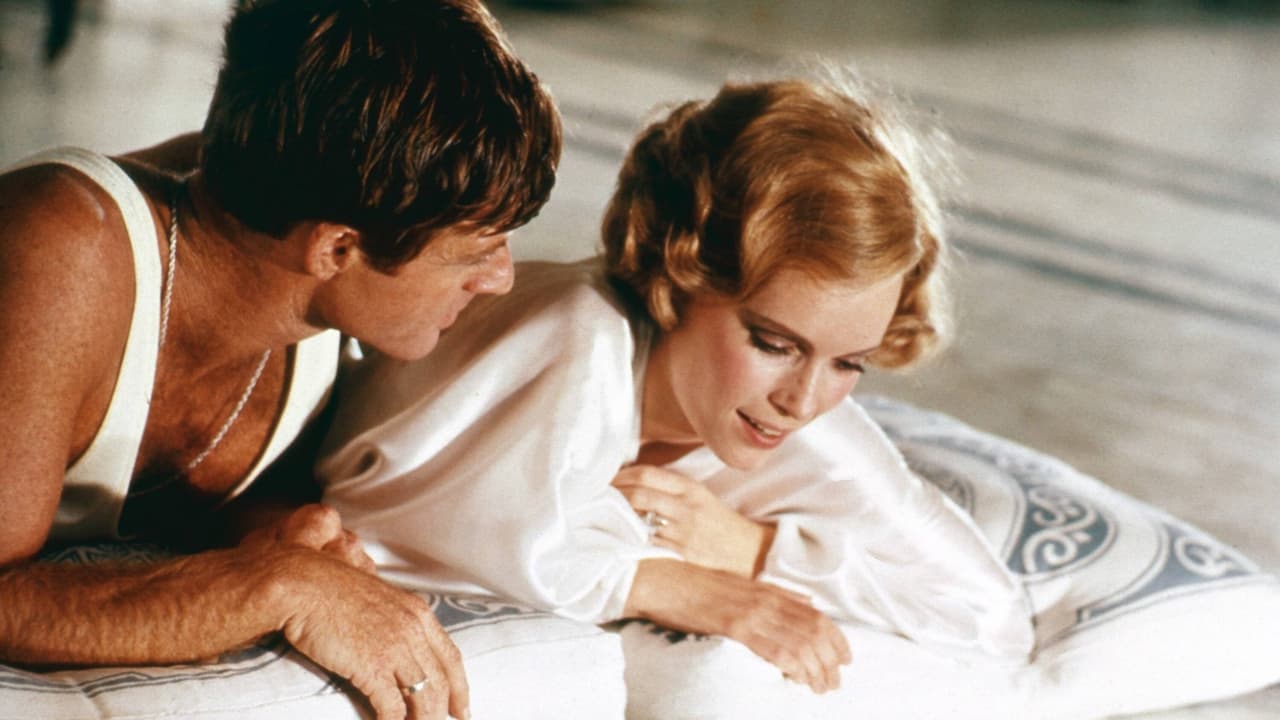Stephanie Mayle
There is much allure to Fitzgerald's best-selling novel The Great Gatsby. Perhaps it's the scandalous intimacy shared between the characters, or the extravagance described in the wealthy life of Long Island. Most of all, however, it is the "in-between-the-lines" spin Fitzgerald puts on his storyline. It's the mystique of not knowing the meaning behind each sentence, and the excitement of the readers to draw their own conclusions about the characters and plot line, both of which the film The Great Gatsby (1974) very much lacks. One specific departure from the story is the controversy of Nick's sexuality, which the film promptly leaves out completely. Throughout the novel, the basis of this controversy is alluded to. "'I beg your pardon,' said Mr. McKee with dignity. 'I didn't know I was touching it.' 'All right,' I agreed. 'I'll be glad to.'
I was standing beside his bed and he was sitting up between the sheets, clad in his underwear, with a great portfolio in his hands
" (Fitzgerald, Chapter 2). What happened in this moment is not specifically stated by Fitzgerald, leaving the readers to draw their own conclusions, and creating a scene that is completely left out from the film. Another difference between the two is the greater emphasis placed on Gatsby and Daisy's relationship in the film than in the novel. In the book, since Nick is the narrator and all is told through his eyes, the readers only see such, leaving much of Gatsby and Daisy's growing relationship in the dark, with only slight references to the workings behind their correspondence. "'I hear you fired all your servants.' 'I wanted someone who wouldn't gossip. Daisy comes over quite often--in the afternoons.'" (Fitzgerald, Chapter 7). In the film, the audience is given the privilege of a larger glimpse into their conversations and meetings. This, however, destroys some of the mystery of not knowing, such as in the novel.The director of the film The Great Gatsby (1974) probably chose to make these changes to Fitzgerald's story because he wanted to savor the plot, the theme of the tale, not the language and diction that Fitzgerald so eloquently placed on paper. In terms of accuracy and storyline, yes, the movie represents the novel. Although, in correctly replicating the overall ideas and emotions and enigma behind Fitzgerald's characters and scenarios, the film does not even come close. As far as personal preference, the novel comes in first by far. There's something about being able to visualize scenes and interactions in the mind, just from simply ink on a page, that a movie will never be able to quite capture.
thedietrich
The movie's plot thickens towards the end but ultimately fails to capture the nuances of character that only the printed page can provide. As such, it lacks both the gripping drama of film and the thoughtful depth of a written work leaving the viewer high and dry. The last 30 minutes or so retain the viewer's attention as a murder mystery, but the other 75% of the movie is painfully slow, vapid, and uninteresting. It tries desperately to be artistic, but instead succeeds in being sophomoric at best. For instance: there a shot which lasts almost a full 6 seconds (I think) which consists solely of a dancing woman rabidly flailing her mini skirt back and forth at a dance party. After an agonizing 1hr or so of this, we get a brief, relatively simple murder mystery, and the end.
matteo_raw3000
The Great Gatsby is set in the summer of 1922, a time that was defined by glamorous parties, loud music, high-class living and underworld life. It was an era of parties and good times, both for the wealthy and for the thousands who flocked to liquor, jazz and a general relaxation of inhibitions.Nick Carraway is the narrator. He is also a main character and Gatsby's closest friend and confident. He is loyal to Gatsby's dream and ultimately commits himself totally to Gatsby. Through Nick's point of view we see the events of the novel. Also, he does not clearly see or understand all that is happening, a confusion shared by the reader. We learn Gatsby's feelings and hopes as seen by Nick.Jay Gatsby makes his first appearance at the 30 minute mark. That is rather odd, as the other main characters are introduced from chapter one. All we know about him is that he is Nick's neighbor, lives in a big mansion in Long Island and throws big parties every night. His parties are the center of the novel, they are so vividly described and we are completely drawn into Gatsby's world. Supposedly Fitzgerald who also lived in Long Island got his inspiration for Gatsby's parties from his neighbor. The novel is structured around parties, both large and small. Thus far we know little about the man Gatsby. Who is he? Why does he throw parties every night? We are yet to find out. He soon makes acquaintances with Nick and draws him into his inner circle. A business partner of Gatsby is Meyer Wolfsheim, a disguised Arnold Rothstein, the notorious gangster who fixed the 1919 baseball world series. We learn that Gatsby has had an affair with Daisy, Nick's cousin, now married with idealistic, corrupt millionaire Tom Buchanan. The novel is about a quest: Gatsby's quest of having Daisy. This is the dominant motive in the novel. He seeks to repeat the past and the magical moment from five years ago when he was a poor young man, enlisted in the army. He knows all about Daisy – where she lives, whom she is married to. They eventually get together and for a brief period the two are happy together. Gatsby's dream is so close to succeed and he wants to put an end to the hiding and get Daisy only for him because he is afraid of the consequences of not having her after he was blinded by so many hopes and dreams.Gatsby is a tragic character: not only he would give everything in his pursuit of Daisy but also his doomed from the start relationship with her got him killed.As seen by the common reader he has a perfect life: his wealth is never cloaked; from the mansion, to the weekly parties, to the countless dress shirts and expensive cars, it is evident that Gatsby is rich as sin and is initially, through his inclusion in the nouveau rich, the epitome of the American dream. He's handsome, he's rich, he's socially reputable. What the reader doesn't know is that he built his empire with Daisy in mind and probably for her. Hadn't she had such an impact on him, he might not become that rich. What should we think of him: a romantic or a man who wants all for him? First time I saw this film, found it a bit too pretentious. Just before I read it the second time and saw two different Gatsby films I realize the impact it had had on me. One thing that I like about The Great Gatsby is that it works on so many levels: a romance story, a lavish description of the 1920's, a tragedy and a story about two characters longing for happiness: this is as much Nick's story as it is Gatsby's.
CinemaCocoa
Starring Robert Redford in the titular role, I wasn't even aware of this films existence until the new film released, and apart from some dated cinematography, this film by Jack Clayton came very close to how I felt the book was told.Seen from the perspective of everyday man Nick Carraway (Sam Waterston) visiting his cousin Daisy Buchanan, we are exposed to a lifestyle of American bliss, riches, ignorance and selfishness. Jay Gatsby, a mysterious man who hates social interaction, hosts parties at his mansion every week for anyone to attend. But he personally invites Nick, seemingly out of the blue, as his confidant and soon Nick discovers that recluse and shadowy Gatsby has feelings for the married Daisy.The book is a quick read; it barrels along because it does one thing only and does it well, it explores the sickness that comes with riches and the often two-faced nature of human beings for both good and ill reasons. Daisy is the embodiment of blissful ignorance; on the surface she is a damsel, she says all women can only be "beautiful little fools", but deep down she has an unpleasantness all her own. Every character has this dark trouble inside of them, apart from Carraway, who behaves here much as he does in the book; as an audience surrogate. The betrayal, misdeeds and affairs that run through the other characters can be clearly shown from the eyes of an outsider.Jack Clayton's film captures the look and feel of the book excellently; from Gatsby's mansion to Wilson's garage, from the cars to the ominous billboard that watches over our characters with unblinking eyes. With a run time of over two hours, everything is explored in detail and the script is the dialogue lifted from the source material. Most of the iconic lines are left intact, and delivered with conviction.However towards the end of the story I wasn't sure if all the characters' darkest motivations were given their fullest attention. I didn't feel Daisy was represented as selfish or as destructive as she could have been, for me the tables radically turn on all of the characters throughout the book. The same goes for Gatsby himself, but his character is more up to personal interpretation (by the end of the book, I didn't care for Gatsby) A final note on Redford's Gatsby, he is good in the role as he pulls off the shady and introverted one moment and the noble soldier in the next with authenticity. He looks like he could have been a soldier a lifetime ago.That is what seems best about this film; its honest appearance and integrity to the book. It just might seem a bit drab, I'm not sure it captures quite how truly weak and corrupted each of the characters truly were.



 AD
AD





